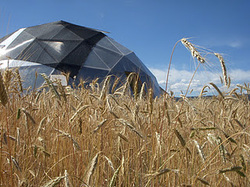Natural Weed Control & Re-vegetation
Conventional approaches to weed control focus on the use of chemical herbicides, which are costly both economically and ecologically. At EcoSystems Design Inc. we take a more holistic approach, considering not just the problems we observe but more importantly, the ecological conditions that enable them to thrive. By first working to restore health to the degraded soils subject to weed infestation, we can then help to accelerate the natural re-colonization of abused landscapes by healthy, native plants and productive pastures.
At EcoSystems Design Inc., we begin with an overall assessment of soil conditions and weed problems, using one or more of the following strategies to correct the problems.
At EcoSystems Design Inc., we begin with an overall assessment of soil conditions and weed problems, using one or more of the following strategies to correct the problems.
Our Specialized Program
- Soil Re-Mineralization
- Natural Fertilizers
- Mycorrhizal Soil Inoculation
- Cover Cropping (Summer & Fall)
- Manual Weed Control Including Grazing of Animals
- Biological Control for Thistle & Tansy
- Mulching
- Re-Seeding of Hardy Native Perennials, Wildflowers, Grasses & Shrubs
Government agencies, ranchers and others have been fighting a losing battle against the encroachment of noxious weeds in the west. This problem is reaching a crisis stage in many areas, as the weeds displace grasses and native vegetation, range lands become less productive, areas are not as accessible for recreation uses, property values fall and the aesthetic quality of the land is diminished.

Traditional chemical approaches to eradicating weeds, while often leading to some short-term results are failing to provide an adequate long-term solution. Chemical approaches are ineffective because they treat the symptoms of poor soil conditions (i.e. weed infestations) but fail to provide an overall ecological strategy that would improve the soils and prevent the weeds from thriving in the first place. Attacking undesired plant life with toxic chemicals can have some rather nasty consequences for an ecosystem under assault. To understand soil health in the West one must look back in time. Geologically speaking, Western soils are considered "new," having been more recently deposited. They are typically fragile and have thin, easily eroded organic layers. Over the past one hundred and twenty years soils in the West have been degraded by a number of extractive industries which seldom gave much back to the land. While natural processes also played a role in this, much of the degradation has been caused by timbering practices leading to erosion (clear cutting without replanting); mining practices which polluted water and disturbed soils; continued mono-crop farming; over grazing by sheep, horses and cattle; construction of roads and rail corridors; and commercial and residential development.
Weeds are indicators of soil deficiencies and tend to thrive in compacted, disturbed and demineralized soils that have lost much of their organic content. An area that is heavily infested with wild mustard, for example, indicates soils with very low calcium content. Anytime soils are disturbed, depleted of minerals, or heavily trampled, ideal conditions are created for weed growth. From a long-term perspective, weeds are actually helping to heal the land after it has been disturbed. Thistles, for example, extend deep roots and bring depleted minerals up to the surface. They alleviate soil compaction and when they die they deposit organic matter, which helps build topsoil. As the health of the soil is restored the weeds will eventually be replaced. Unfortunatly, the natural restoration of soil by weeds takes an unacceptably long time.
The natural weed control techniques promoted by EcoSystems Design Inc. will speed up the natural soil restoration process. We do this through strategies that include re-mineralization, the introduction of mycohorizal fungi, and cover cropping with aggressive and desirable plants. Chemical approaches, on the other hand, often interfere with nature's restorative strategies by killing food sources for beneficial insects that help control unwanted weed species.
Government agencies and large land holders are beginning to accept more integrated weed control strategies. The time is ripe to promote more holistic natural approaches to this issue. Delays insure that weeds continue to encroach on Colorado's disturbed soils with the potentially dangerous and questionably effective response being the use of chemical controls that contaminate soils, rivers and ground water. We have chemical free solutions that will work.
Weeds are indicators of soil deficiencies and tend to thrive in compacted, disturbed and demineralized soils that have lost much of their organic content. An area that is heavily infested with wild mustard, for example, indicates soils with very low calcium content. Anytime soils are disturbed, depleted of minerals, or heavily trampled, ideal conditions are created for weed growth. From a long-term perspective, weeds are actually helping to heal the land after it has been disturbed. Thistles, for example, extend deep roots and bring depleted minerals up to the surface. They alleviate soil compaction and when they die they deposit organic matter, which helps build topsoil. As the health of the soil is restored the weeds will eventually be replaced. Unfortunatly, the natural restoration of soil by weeds takes an unacceptably long time.
The natural weed control techniques promoted by EcoSystems Design Inc. will speed up the natural soil restoration process. We do this through strategies that include re-mineralization, the introduction of mycohorizal fungi, and cover cropping with aggressive and desirable plants. Chemical approaches, on the other hand, often interfere with nature's restorative strategies by killing food sources for beneficial insects that help control unwanted weed species.
Government agencies and large land holders are beginning to accept more integrated weed control strategies. The time is ripe to promote more holistic natural approaches to this issue. Delays insure that weeds continue to encroach on Colorado's disturbed soils with the potentially dangerous and questionably effective response being the use of chemical controls that contaminate soils, rivers and ground water. We have chemical free solutions that will work.
